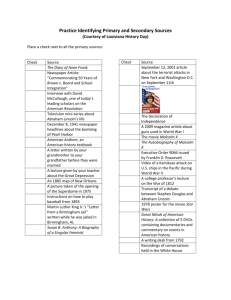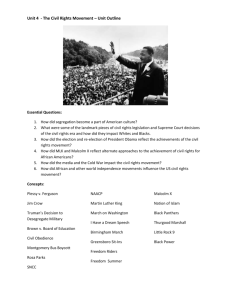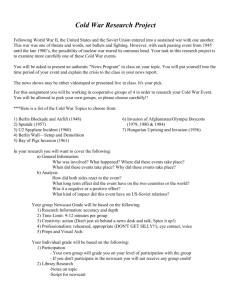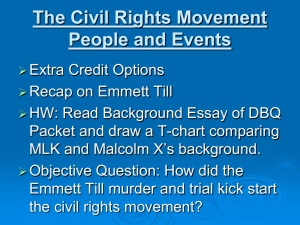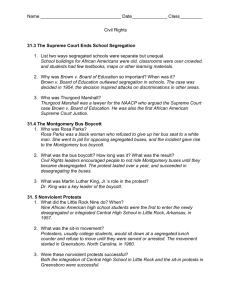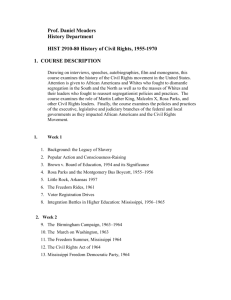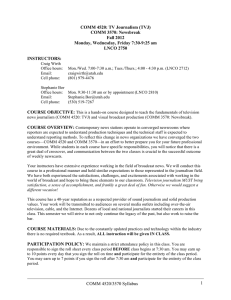Civil Rights of the 1960's Introduction
advertisement
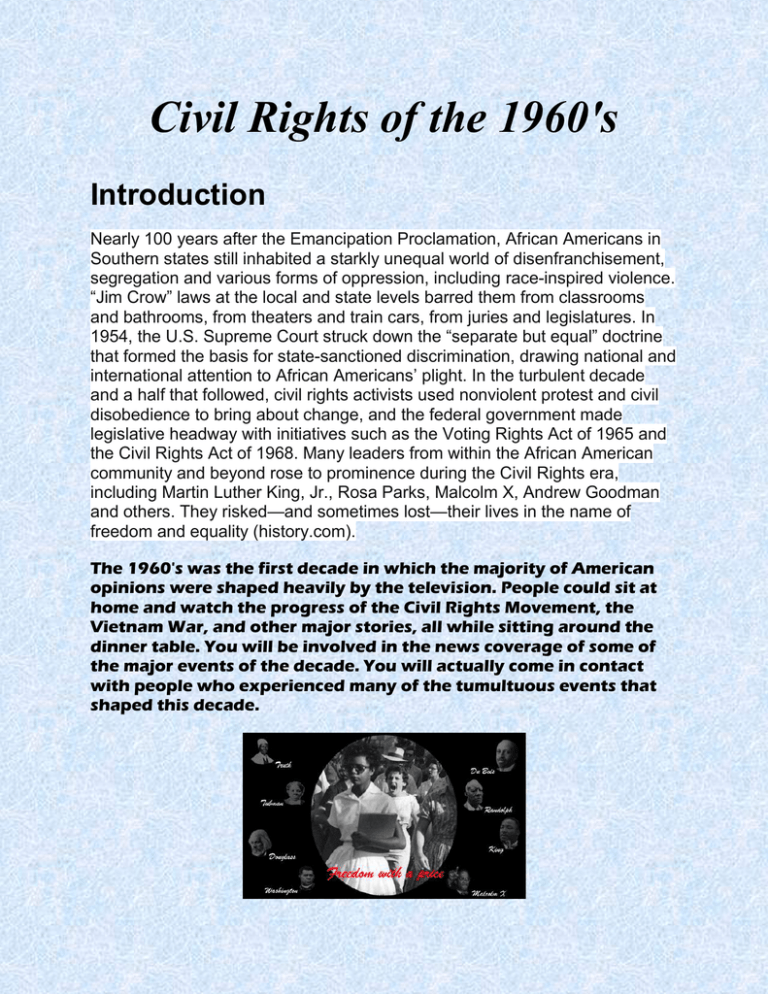
Civil Rights of the 1960's Introduction Nearly 100 years after the Emancipation Proclamation, African Americans in Southern states still inhabited a starkly unequal world of disenfranchisement, segregation and various forms of oppression, including race-inspired violence. “Jim Crow” laws at the local and state levels barred them from classrooms and bathrooms, from theaters and train cars, from juries and legislatures. In 1954, the U.S. Supreme Court struck down the “separate but equal” doctrine that formed the basis for state-sanctioned discrimination, drawing national and international attention to African Americans’ plight. In the turbulent decade and a half that followed, civil rights activists used nonviolent protest and civil disobedience to bring about change, and the federal government made legislative headway with initiatives such as the Voting Rights Act of 1965 and the Civil Rights Act of 1968. Many leaders from within the African American community and beyond rose to prominence during the Civil Rights era, including Martin Luther King, Jr., Rosa Parks, Malcolm X, Andrew Goodman and others. They risked—and sometimes lost—their lives in the name of freedom and equality (history.com). The 1960's was the first decade in which the majority of American opinions were shaped heavily by the television. People could sit at home and watch the progress of the Civil Rights Movement, the Vietnam War, and other major stories, all while sitting around the dinner table. You will be involved in the news coverage of some of the major events of the decade. You will actually come in contact with people who experienced many of the tumultuous events that shaped this decade. The Task You will role play a position for a special newscast over a particular civil rights event. After careful analysis of a particular historical event of the time period, your group will produce a newscast presentation of that particular event. The Process First, you will be assigned to a group of ~4 students who will make up your newscast. Each group will be assigned a particular newsworthy event of the era which you will be assigned to cover. The following events will be covered by the different groups: Little Rock Public School Integration Montgomery Bus Boycott Birmingham Demonstrations Selma Riots Malcolm X After your group and topic have been assigned, you will select a role to play within your group. Each person will have a role with a special perspective to be learned. Each of the following roles could be included within each group. Roles: A news anchor with a major television network. This anchor must have a good overview of the entire event, and be able to provide a good introduction to the newscast. This person may also be able to inject one question to the newsreporter after the witnesses have been questioned. An investigative reporter with a major television network. This reporter must gain a good overview of the entire event, and prepare questions of witnesses. This reporter will also be responsible for providing a good introduction for the newscast, interviews on camera, and a general summary. A Central Participant of the event. This is one of the central characters who was personally involved with the event. They should provide a unique perspective, and be very persuasive in their discussion of what took place. Examples: Rosa Parks, whose actions started the Birmingham bus boycott, or Martin Luther King Jr. who led the March on Washington. A personal witness of the event. This person is pro-civil rights movement. You will need a name, occupation, and a personal experience from the event. The experience should be detailed and vivid, and you should have personal opinions concerning what happened. OR….. A personal witness of the event. This person is anti-civil rights movement. You will need a name, occupation, and a personal experience from the event. The experience should be detailed and vivid, and you should have personal opinions concerning what happened. Your group should tentatively work out the roles for this project, but before proceeding, your team should also confer with me to make sure the roles chosen are the best for each topic. Each person in every group will do research of the event covered. Each person should take personal notes detailing what their involvement in the activity consisted of. You should also keep track of the resources you used for this information. The group will then create a simulated newscast to cover the event. All group members should participate in their respective positions. The newscast can be given live in class, or be recorded on videotape, and be about 5 minutes. Participants and witnesses should be interviewed, and a two-sided overview of the event should be presented. All facts should be accurate. Newscasts should be completed by the deadline date, at which time they will be viewed and discussed in class. Resources In addition to your textbook and other classroom resources, check out the following internet links which specifically address the event which your group is to cover. General Civil Rights - "Everyone Look at These" Civil Rights Movement The Rise and Fall of Jim Crow Historic Places of the Civil Rights Movement National Register Brown v. Board of Education Little Rock (Ark) Public School Integration Meet Central High 50th Uniquely Arkansas/central-high School Integration in Little Rock, Arkansas: Introduction Remembering the Little Rock Nine Montgomery (Ala) Bus Boycott They Changed the World Rosa Parks Profile Colored Reflections - Rosa Parks Bus Boycott Birmingham (Ala) Demonstrations Birmingham Civil Rights District Memorial Birmingham 1963 50th-anniversary-of-the-civil-rights-movement-in-birmingham/ Selma (Ala) Riots 1965 We Shall Overcome -- Selma-to-Montgomery March Selma, AL: National Voting Rights Museum Selma Selma to Montgomery March John Lewis- National Archives Speech of Malcolm X (The group can select the time and place that the speech took place. Primarily, you will outline his philosophy concerning black-white relations in America.) Biography of Malcolm X Malcolm X History The Official Web Site of Malcolm X Malcolm X Biography Interview with Malcolm X Evaluation The grade will be primarily a group grade given based upon the newscast presented. In this grade, everyone will get the same grade for the presentation, but each person's individual notes will also be turned in and included in the evaluation. This means that if one person does not turn in their personal notes, they may get a lower grade than someone in their group who does turn in their notes. Check out Gradescale Conclusion Upon completion of this project, each student should have an awareness of what it felt like to be involved in the civil rights movement. Students should clearly understand the arguments for and against equal rights during the early 1960's. Students should also be able to clearly discuss events of the time period, and the major strategies of various movements within the era.
